Ready to Lead: Mayor-Elect Richard Bissen
Alfredo G. Evangelista | Assistant Editor
Collaborative. Team approach. Open to suggestions. Those are the words Mayor-Elect Richard Bissen used to describe his leadership style as he prepares to take over the reigns as the ninth Mayor of the County of Maui on January 2, 2023.
Bissen ran a bit late for his interview at Koho’s as he was meeting with Kahului Councilmember Tasha Kama. In the primary, Kama’s opponent was Bissen’s nephew, Buddy Nobriga. But from my vantage point, and from my brief conversation with Kama while Bissen headed to the bathroom, the meeting between Bissen and Kama went well.
The Mayor-in-waiting, still the lanky St. Anthony athlete, and possible more reserved than you would expect from a guy who plays music gigs on the side– the lingering vestige of two decades on the circuit court bench—was dressed in a neatly pressed Aloha Shirt. He looked at me directly and I almost called him, “Your Honor.” (I don’t recall ever appearing before him in court but I think at the early stage of my legal career, he was a law clerk for the late Richard Komo for a trial in which I was the second chair.)

Photo: Alfredo G. Evangelista
“The key is to surround yourself with good people and make it an inviting situation,” Bissen, a retired Chief Judge, explains. Bissen is preparing to appoint his team of Directors and Deputy Directors as well as his staff. Bissen’s first announcement on December 12 was to name retired Deputy Police Chief Keku Akana as Managing Director. (Back in high school, Keku and I served as acolytes at Good Shepherd Episcopal Church in Wailuku. Bissen himself was a former altar boy.)
Bissen counts twelve directors who will need Council approval and twelve deputy directors who will not need Council approval. (Four directors are appointed by a county commission.) Bissen explains the charter amendment with a new Housing department will not be effective until 2024. “[The Council will] have to fund it, create the positions, kind of like the Department of Agriculture,” he noted.
“Of course,” said Bissen, when asked if his cabinet will be ethnically diverse. As of the date of the interview on December 7, Bissen said he hadn’t seen who had applied for the various positions so he could not commit to whether there would be any cabinet members of Filipino ancestry as it depended on who applied. “The first interviews have started today. I have an executive review team and an administrative review team. The executive review team is reviewing the twelve directors and the twelve deputies. The administrative hiring team—as you may know there are approximately fifty positions in the Mayor’s office—will be reviewing people interested in appointed positions that are not directors.”
A 1979 graduate of St. Anthony High School, a 1983 graduate of Santa Clara University (the “real SC,” he explains to me twenty-five minutes into the interview), and a 1986 graduate of the William S. Richardson School of Law at the University of Hawai‘i at Mānoa, Bissen has worked for a county, the state and the Judiciary. Of the eight Mayoral candidates in the primary, Bissen suggests he had the most comprehensive experience in government, having worked in a County department (Prosecutor’s Office under several Mayors), two State departments (Attorney General’s Office and Public Safety Department under Governor Linda Lingle) and in the Judiciary. “I think I have a pretty good awareness of how the system operates but we’re all a bunch of individuals trying to plan, work together so I think I understand compromise, diplomacy. As a Judge, I was pretty much a decision maker so I understand I was elected to make decisions, set policy, strategy and implementation. I’m looking forward to that.”
Bissen recalls serving with presumptive Council Chair Alice Lee. “We served together as cabinet members. She was housing [and human concerns] I believe under Kimo Apana when I was the Prosecuting Attorney.”
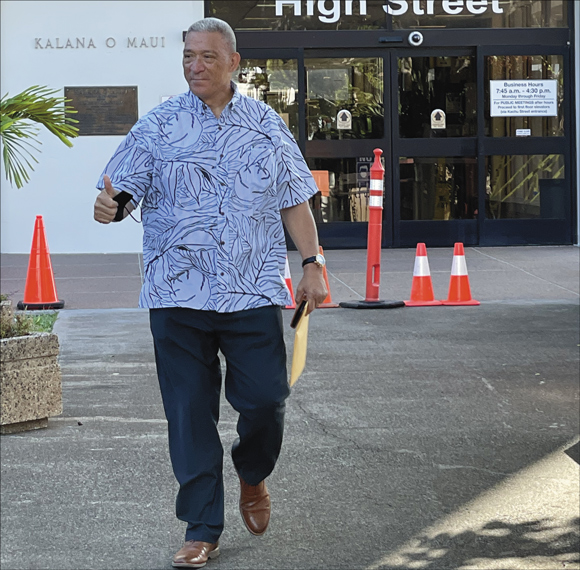
Photo courtesy of Richard Bissen
While serving as a Circuit Court Judge from 2005 to 2021, Bissen was prohibited from engaging in politics. “I think it’s like any other relationship,” he responded when asked how he expected to develop a relationship with the Council. “I’ve testified before the Council in my previous position at the Prosecutor’s office. I’ve testified at the State legislature in different capacities so I understand their function. They want information from me to do their job. I plan on having a respectful relationship with them; obviously a professional relationship with them. I think I have performed in a professional manner throughout my career. I don’t expect that to change but I think it will be mutual. I don’t have any personal relationships with the people on the Council. I know some longer than others. I’ve worked with some in the community in my previous positions. I’m looking forward to working with the Council.”
Bissen recognizes his role as Mayor will be “a lot different” than his role as a Judge. He’s okay with not having the final say. “I understand my role. I wasn’t always a Judge. I was a Director in a department so I know what’s it like to testify before the Council. I know what it’s like to deal with the unions for employees. I know what it’s like to hire employees, to prepare a budget, to defend your budget at the Council. I know a lot of the back of the house.”
As Mayor, Bissen will also need to develop his relationships with Maui’s state legislators and Hawaii’s congressional delegation. “I plan on having a very close relationship with our state legislators. I want to have regular meetings with them; maybe monthly meetings–when they’re on Maui, talk to them about issues important to our County.”
Bissen noted how U.S. Senator Brian Schatz was very gracious in reaching out to him after the general election. (Bissen’s youngest daughter was a previous intern for Schatz.) “I plan to listen and learn as I have in every role that I have taken up until now as I’ve known my place in the structure.” Bissen jokes that as the youngest child in the family, he learned how to behave and when it was his turn to speak or listen. He recounted how his elder siblings would “straighten him up” and noted they were better athletes than him.
As a grandfather, Bissen is deeply concerned about future generations. He explains the difference between generational thinking and political thinking. “Generational thinking is what we would have wanted for those who came before us to do—what can we do today that will help our generations twenty years from now. What happens with political thinking is people think in two years and four years terms or cycles because that’s what gets you elected and re-elected. We should be thinking about two generations and four generations ahead. Right now, we’re reactive. I want us to be pro-active. I don’t want us to be at the whim of what’s happening around us.”
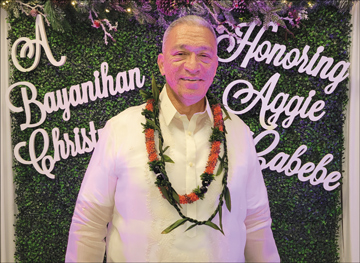
Photo: Alfredo G. Evangelista
Bissen questions why we’re still talking about housing, water, tourism and most recently, homelessness. “The problems are the same but the solutions got to be different,” he says. “And I think a big way for us to try. I’m naive enough to say I’ll try this. Let’s try to do the long-term. Plant a tree today for whose shade you will never experience. We want to set up a way of doing things–a foundation so maybe those who come after us can think in those terms. Maybe it’s because I’m an older, first-time candidate I don’t have the desire to do anything else but this.”
As applied to his priorities—housing, developing water sources and preserving water sources—generational thinking means investing now for future generations.
Bissen says the lack of water is an important issue. “We should own our water but I don’t think we should manage the water. I don’t think we’ve shown any expertise in managing. I do think we should talk to those people who are experts and good at it. When I say ownership, I’m talking about who gets to use the water, how much, at what rates. I think we can probably put our heads together and decide what we think is sustainable, what is most productive and helpful for our community.”
“There’s two places we should be looking for water—where the people live and where there’s a drought,” he asserts. “What we’re doing now is delivering water from one place where there’s plenty of it to some place where there is not a lot which means people live in one place and the water is at another place. We’re so used to transferring water from East Maui to say Upcountry Maui or somewhere else, we’re not taking the time or energy to see if there’s water that can be developed in those areas. At some point somebody’s got to bite the bullet. Now is the time because we have this money drop from the federal government for infrastructure and resources. What I want us to think about in my administration is generational thinking not political thinking.”
Bissen’s “Can do” anything mantra is borne by his belief that “I think anything is possible.” He anticipates regular meetings, maybe more frequently with his team. “I’m going to keep on top of housing being built on Maui more than any other thing. Housing and developing water resources will be my two main focuses. Every week, I’m gonna ask my guys, ‘Where are we on housing? Where we at on the water?’”
He believes his accessory dwelling units (ADU) plan—more than the 1,000 feet ‘Ohanas that have been historically allowed—is the best way to attack the housing problem and has set a goal to be accomplished within the first six months of his term. “We want a hundred accessory dwelling units approved within the first one hundred and eighty days. We want to submit three separate plans: a studio, a one bedroom and two-bedroom units—the most popular models. We want them to be pre-approved by the different departments that have to approve those permits so that people can do owner-builder, hire contractor—as long as you’re on the County sewer, County water. If you don’t fall under that, your permit will have to go through the normal process. That’s the quickest and easiest way to get affordable housing.”
Bissen will also continue with those projects in the pipeline. “I think the previous administration started to put a lot of homes in the pipeline. I think we should continue those programs that do allow affordability for people.”
But Bissen knows there will always be a homeless situation. “We shouldn’t put the pressure on ourselves to end homelessness. I want to help those we can. I’m an advocate of people living in their cars. We should transition people from where they are to where we can help them. There’s a lot of good we can do to help our citizens that are on the cusp. They have jobs; they just can’t afford rent or a mortgage and so we should help the ones we can. Since the beginning of time, we have people who choose this lifestyle.”
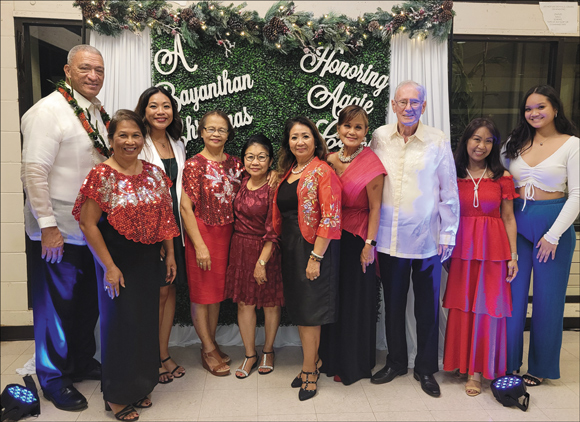
Photos: Alfredo G. Evangelista
The planning department will play a key role. He explains he needs to understand the complete challenges of the planning department. For example, the planning department has to deal with different rules, laws, ordinances that can come into conflict. “We should put some kind of system in place that allows for this potential type of conflict to be reviewed all at once—not a piecemeal approach. I think we have to anticipate common issues that come up. We can’t keep kicking the same stone every time it happens. We got to learn our lesson and say this is what we could have done to prevent this from happening.”
As far as tourism, Bissen understands over fifty percent of Maui’s income comes from tourism-related businesses. He notes the impact tourism has on small businesses, restaurants and similar businesses. But he cautions: “If we’re going to replace, diversify our economy, we have to have something to replace it with. I don’t know if ag will be enough.”
To Bissen, the future of tourism means striking a balance. “We love tourism, we just don’t always love tourists. We like the money that comes out of it. We don’t always like the impact that comes out of it.” He says the first thing is to recognize there are limitations. “What can we do to maximize the economic benefit while minimizing the infrastructure and resource impact? That’s the question; that’s always going to be the question. We’re a huge visitor destination in the world—no question about it.”
As far as caps on hotel construction, he says it’s up to the Council and he is willing to hear what the Council says but notes “I’d rather incentivize than punish people for their behavior. I think motivation is probably more positive than moratoriums.” As far as the cap of tourists per residents, he notes those numbers were exceeded and says Maui has to either stick to those numbers or change them. “We can’t ignore it.”
Bissen also noted it’s not tourists who leave abandoned cars, washers on the side of the road. “We have to take pride in ourselves too. I think we can all do a better job.”
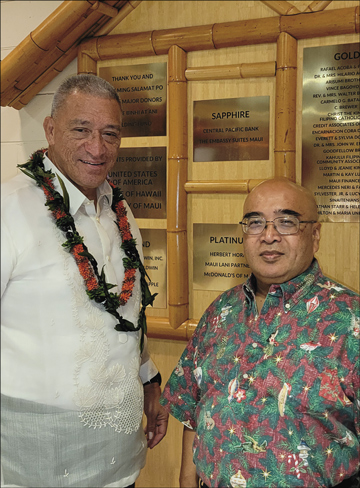
Although Bissen hasn’t met with Mahi Pono yet, he says “We want to attract people who will be good stewards of the land, help employ our people and of course grow our food. For us, we have to decide whether someone is a good neighbor or not a good neighbor. I think they’re providing a valuable service in that they’re planting in the central valley. Again, we can disagree with the types of planting. One thing that is important is they hire local people. I compare it to Walmart, Target or Costco. These are companies that hire a lot of local people. They provide a service—goods and services that we’re buying. Nobody is saying shut down Walmart. I like the small mom and pop businesses—they’re the backbone of any community. I just think we gotta be consistent in what we’re talking about. I’m not making a moral judgment about this company or any other company but as long as they hit the points we want them to hit—they provide value, they provide a service, more than they’re taking—that’s the equation. If not them, then who? How are we going to get food produced? How are we gonna get the central valley grown and get more jobs?” Bissen is confident he can have frank conversations with former Lt. Governor Shan Tsutsui, Mahi Pono’s Chief Operating Officer and face on Maui.
Bissen looks forward to the many events of Maui’s Filipino community. “Sure,” he says when told he is expected to attend every single Filipino event. “If I can’t make it, I’ll send a representative.” When told he would be crowning queens, he quipped “I think I’m taller than most of them.” (Bissen is very familiar with beauty pageants because his sister Lehua Bissen Nobriga—a former Miss Hawai‘i—used to run the Miss Maui pageants and Bissen would be the Master of Ceremonies for some of those pageants.)
While Bissen is initially a bit reserved in making political promises, he did say “We should do that” in reference to a monument honoring the Maui Volunteers (see the October 15, 2022 issue of The Fil-Am Voice), comprised primarily of Filipinos during WWII.
Bissen seemed to be at ease engaging with members of Maui’s Filipino community during the recent “A Bayanihan Christmas: Aggie Cabebe Scholarship Fundraiser.” Dressed sharply in his Barong Tagalog, he chatted with old and new friends and posed for photos, claiming however he doesn’t smile for photos. Like other elected officials, he had multiple events on his calendar that night but was able to arrange for a representative at the other event so he stayed at Binhi at Ani Filipino Community Center for the whole evening; after all, his residence at Pohaku Street in Kahului was just a short drive away. When Bissen was called to the stage to say a few words; he joked at his host. But Bissen was dead serious when he asked for everyone to work together.
On January 2, 2023, Mayor Bissen will officially begin his role as leader of the County of Maui and he will get his shot at implementing the Kamaaina Prosperity he talked about as a candidate.
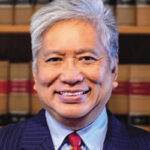 Alfredo G. Evangelista is a graduate of Maui High School (1976), the University of Southern California (1980), and the University of California at Los Angeles School of Law (1983). He is a sole practitioner at Law Offices of Alfredo Evangelista, A Limited Liability Law Company, concentrating in estate planning, business start-up and consultation, nonprofit corporations, and litigation. He has been practicing law for 39 years (since 1983) and returned home in 2010 to be with his family and to marry his high school sweetheart, the former Basilia Tumacder Idica.
Alfredo G. Evangelista is a graduate of Maui High School (1976), the University of Southern California (1980), and the University of California at Los Angeles School of Law (1983). He is a sole practitioner at Law Offices of Alfredo Evangelista, A Limited Liability Law Company, concentrating in estate planning, business start-up and consultation, nonprofit corporations, and litigation. He has been practicing law for 39 years (since 1983) and returned home in 2010 to be with his family and to marry his high school sweetheart, the former Basilia Tumacder Idica.
